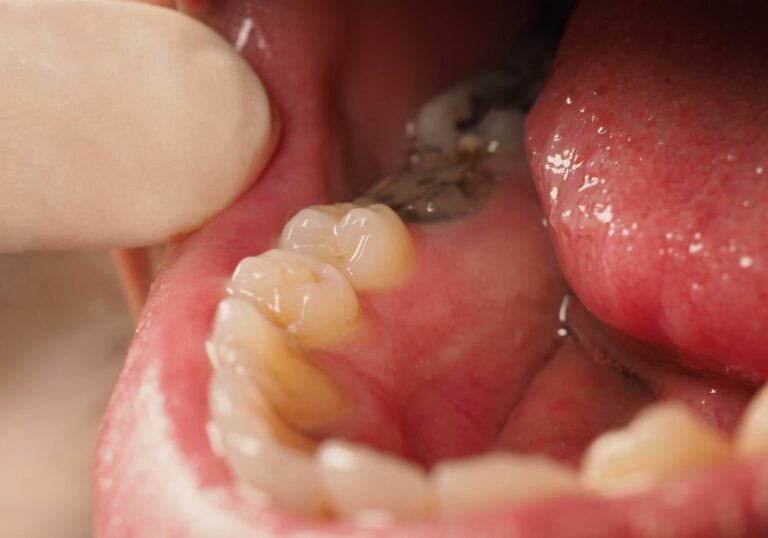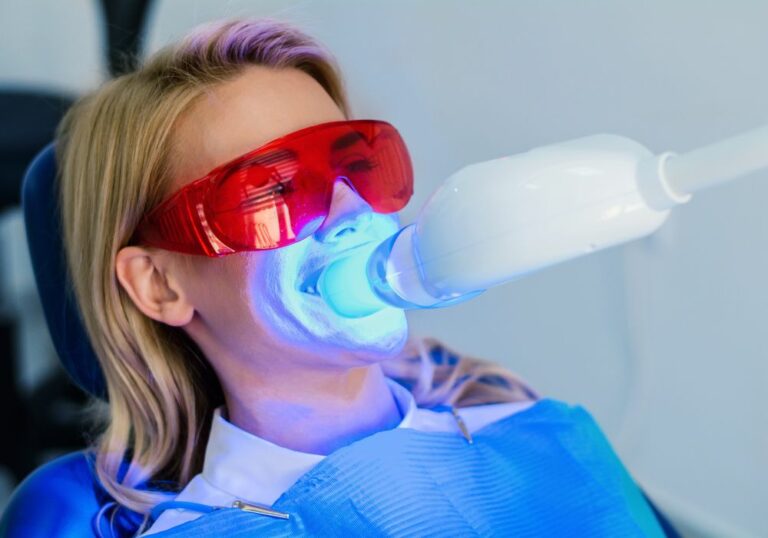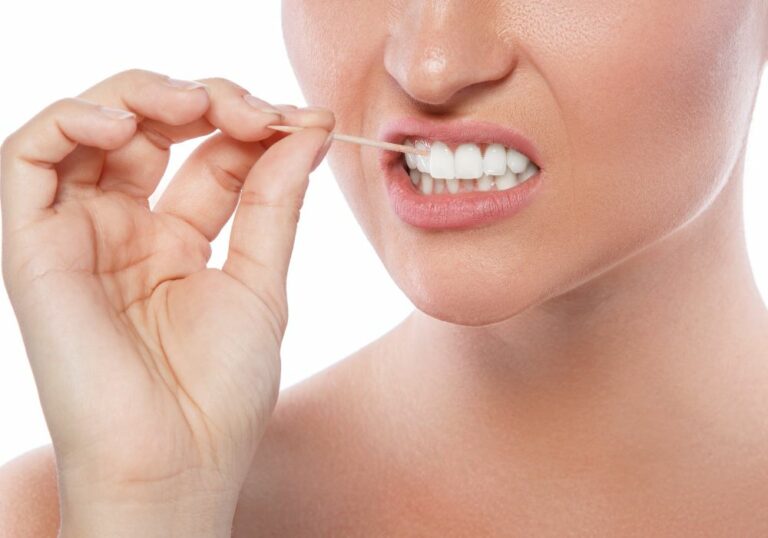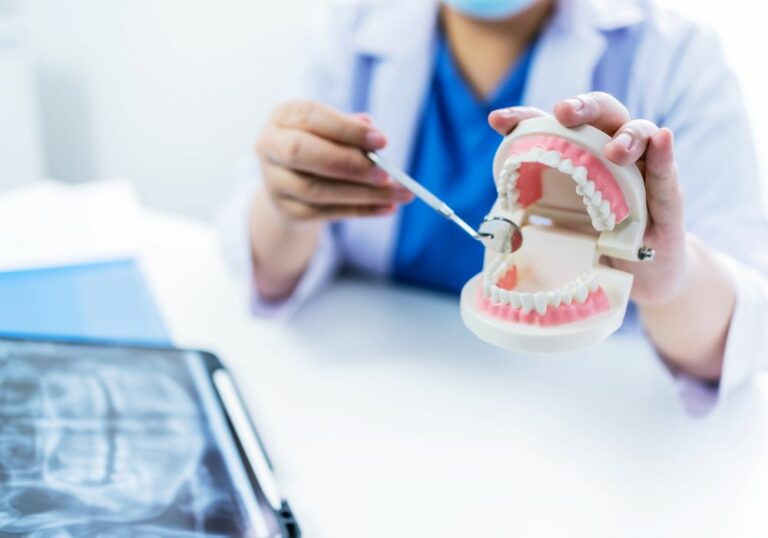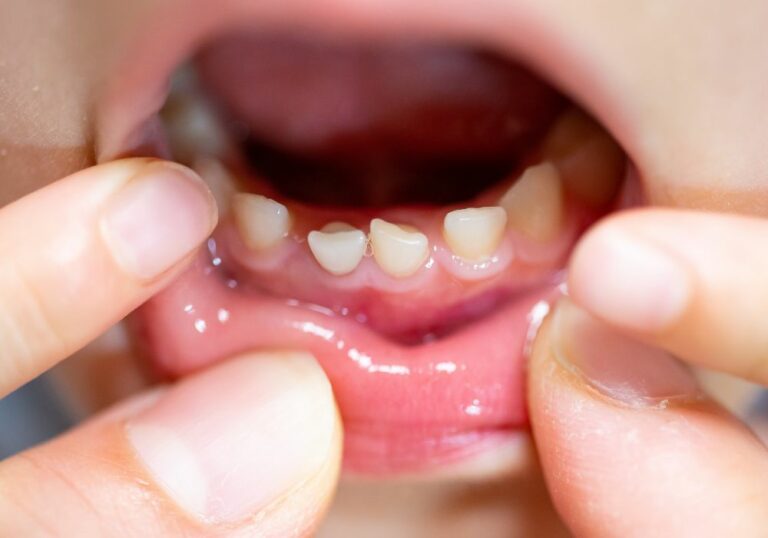Chewing gum is an enjoyable habit for many people. The act of chewing provides distraction and stress relief, freshens breath, and can even help strengthen jaw muscles. While gum chewing is safe for most people in moderation, some experience bothersome tooth and jaw pain from chewing gum. If your teeth become sensitive or hurt when chewing gum, it can make this habit less appealing.
This article explores the most common reasons that chewing gum may hurt your teeth or jaws. It provides tips on choosing better gum options, chewing smartly, and protecting your oral health while still satisfying your desire to chew gum. We will also cover warning signs of serious dental issues associated with chewing discomfort. Read on to chew gum safely and comfortably.
Why does it hurt my teeth when I chew gum?
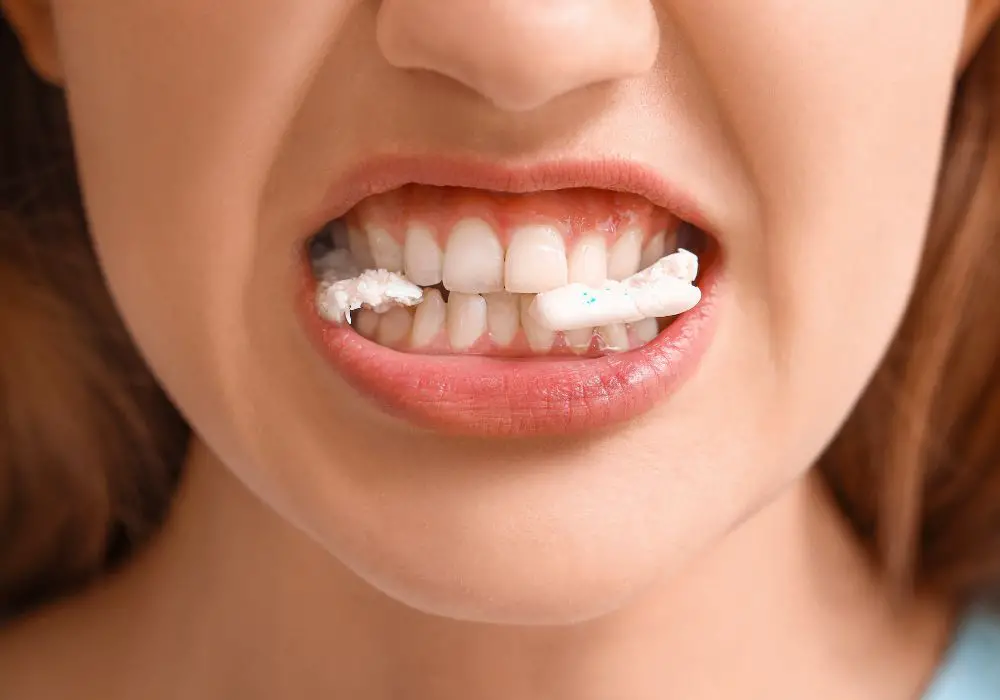
Chewing gum can sometimes cause tooth sensitivity or pain. There are a few potential reasons why this may occur:
Overuse of chewing muscles
Chewing gum requires repeated clenching and chewing motions that can overwork the jaw muscles and joints. This can lead to muscle soreness or joint pain that may radiate to the teeth.
The temporalis muscle, which is one of the powerful muscles that closes the jaw, and the masseter muscle, which is the main muscle that elevates the jaw for chewing, are activated during gum chewing. Overworking these muscles continuously with vigorous chewing and clenching motions can cause muscle fatigue and tenderness that feels like tooth pain or sensitivity.
The medial pterygoid muscle and lateral pterygoid muscles are also involved in opening and closing the jaw during chewing. These muscles can spasm or get overworked as well. Grinding and clenching the teeth together forcefully requires contraction of the temporalis and masseter muscles, putting them under significant strain.
When the jaw muscles are tired out from prolonged gum chewing sessions, they may feel stiff, tender, or achy. This discomfort is often felt as a dull, radiating pain in the teeth or gums, rather than isolated to the muscles themselves. The maxillary teeth in the upper jaw and mandibular teeth in the lower jaw can both be affected.
Pressure on teeth
The constant force and pressure applied to the teeth during active chewing of gum can irritate the periodontal ligaments around the teeth. These fibrous ligaments act as shock absorbers and support structures that anchor and hold the teeth firmly in place within the jawbone sockets.
Too much direct pressure on the teeth from chewing forces can inflame and micro-traumatize the periodontal ligaments, making teeth feel sore, loose or sensitive. Teeth may also feel mildly mobile or like they are rocking back and forth more in the gums.
Chewing also creates compression forces that press the top and bottom teeth together. With gum, unlike with food, this force is prolonged over time. This constant compression can strain the ligaments and cause pain in teeth that are already hypersensitive from other causes like tooth decay or cracks in the enamel. The more vigorously someone chews gum, the more pressure is placed on the teeth and surrounding tissues.
Hard or sticky gum
Opting for very hard or sticky gums that require excessive force to chew can put undue strain on the teeth. Chewing hard gum can cause the teeth to rock more strongly in the sockets, overworking the periodontal ligaments. Very sticky gum can tug on dental restorations like fillings, crowns, or veneers, causing discomfort.
Sugar-free gum is often designed to be extra stiff, dense, and sticky for longer-lasting flavor. The combination of sticky gum base ingredients along with sugar alcohols like sorbitol or xylitol can make some sugar-free gums especially likely to pull on teeth and cause pain with extended chewing.
Jaw clenching
Many people unconsciously clench their posterior molars together or grind their teeth together while chewing gum. This can put abnormal strain on the temporomandibular joints, compress jaw muscles, and cause muscle tension and tightness in the face, neck, and shoulders.
Clenching and grinding habits may be worsened by the motions of chewing gum, leading to overworking of the jaw muscles. Bruxism can lead to radiating tooth sensitivity or pain, as well as headache, earache, and soreness of the temporomandibular joint. These pains are made more prominent by gum chewing.
Dental problems
Chewing gum may further irritate or aggravate existing dental problems:
- Tooth decay – Chewing transmits pressure down through decayed areas of a tooth that may not otherwise be stimulated. Any remaining nerve tissue in the decayed tooth may cause pain. The sugars in some regular gums also feed the bacteria that cause cavities, advancing the decay process.
- Cracked teeth – The repetitive pressure of chewing can worsen microscopic cracks in teeth, allowing them to expand and deepen over time. Symptoms like temperature sensitivity or sharp pain when chewing may become more pronounced.
- Loose teeth – The pressure of gum chewing can dislodge teeth that are already loose due to advanced periodontal disease or because they are baby teeth close to falling out. The compression forces irritate the stretched periodontal ligaments around the loose teeth.
- Worn enamel – Over many years, chewing a very abrasive gum can wear down, thin, and damage the external enamel layer of the teeth. This causes increased temperature and pressure sensitivity as the softer underlying dentin is exposed. Citric and other acids in some gums also contribute to erosive wear.
- Bruxism – Unconscious habitual clenching and grinding of the teeth is exacerbated by gum chewing and the bite forces it requires. This can lead to face pain and tooth sensitivity or pain from the abnormal muscular activity. Custom nightguards help prevent damage.
- TMD disorders – Problems with the temporomandibular joints like osteoarthritis, disc displacement, or dislocation can cause referred pain in the teeth. Gum chewing motions tend to worsen this symptom.
Acidity
Many gums include citric acid or malic acid to provide a tart, fruit flavor. With prolonged chewing, the acidic chemicals can lower pH levels in the mouth and interact with the enamel on the tooth surfaces. This temporary increase in acidity can irritate and demineralize vulnerable tooth enamel, increasing sensitivity.
Softened, cracked, or damaged enamel is already prone to acid penetration, so acidic gum flavors tend to aggravate existing dental issues. Acidic gum can also burn or irritate oral ulcers, inflamed gums, or other mouth tissues leading to discomfort.
Sugar alcohols
Sugar-free gums typically contain sugar alcohols like xylitol, sorbitol, or mannitol to provide sweetness without adding cavity-causing sugar. While these alcohol-based sweeteners have dental benefits, when consumed excessively they can draw fluid into the intestines through osmosis, causing diarrhea or loose stools in some people.
This rapid fluid loss from the body can also cause drying and irritation of oral tissues, including the gums, tongue, and cheeks. Dry mouth is exacerbated and saliva flow decreases further. Reduced saliva leaves the teeth more prone to the negative effects of acids and plaque bacteria. Lack of lubrication can make chewing gum uncomfortable against dry mouth tissues.
Other ingredients
A variety of natural and artificial flavorings, coloring agents, and preservatives are included in gum. When chewed continuously over a long session, some additives may provoke irritation or allergy symptoms:
- Aspartame – This common artificial sweetener can release methanol and formaldehyde during digestion. In those sensitive, it may increase tooth sensitivity temporarily.
- Menthol & peppermint – These cooling ingredients provoke cold sensitivity in some teeth, especially if gum chewing follows brushing with a mentholated toothpaste. The menthol may irritate gum tissues.
- Cinnamaldehyde & carvone – Cinnamon and spearmint flavors contain oils that may irritate mouth tissues and increase gum pain, especially if tissues are already inflamed.
- Titanium dioxide – This whitening agent can erode enamel. Other dyes like FD&C coloring agents may provoke allergic reactions in some.
- Preservatives – Parabens, antimicrobials like triclosan, and antioxidants like BHT may cause contact allergies or irritation in sensitive individuals when exposure is prolonged.
Oral health factors
Existing oral health issues can make someone more prone to chewing discomfort and make gum chewing a bad idea:
- Gingivitis & periodontitis – Marginal gum inflammation makes tissues tender and easily irritated by chewing motions. Infected gum pockets are painful when compressed.
- Receding gums – Gum recession exposes sensitive tooth roots which have much less protective enamel covering them. Chewing irritates this unprotected dentin.
- Worn enamel – Enamel thinned by acidic or abrasive factors is more easily irritated by chewing pressure and temperature changes.
- Bruxism – Those with habits like teeth grinding or clenching already have sore, sensitive teeth prone to chewing pain. A mouthguard helps prevent worsening from gum chewing.
- Oral ulcers – Canker sores or cold sores get further aggravated and inflamed by friction from chewing gum.
- Recent dental work – Teeth may remain sensitive for weeks after procedures like fillings, crowns, or extractions. Chewing pressure during recovery should be avoided.
- Tooth bleaching – Bleached teeth are dehydrated and temporarily sensitive to pressure. Chewing gum could irritate them.
- Bulimia – Frequent purging brings stomach acid into contact with tooth enamel, increasing sensitivity to chewing forces.
- TMD disorders – Jaw joint problems like arthritis or disc issues cause referred tooth pain made worse by gum chewing.
When to see a dentist
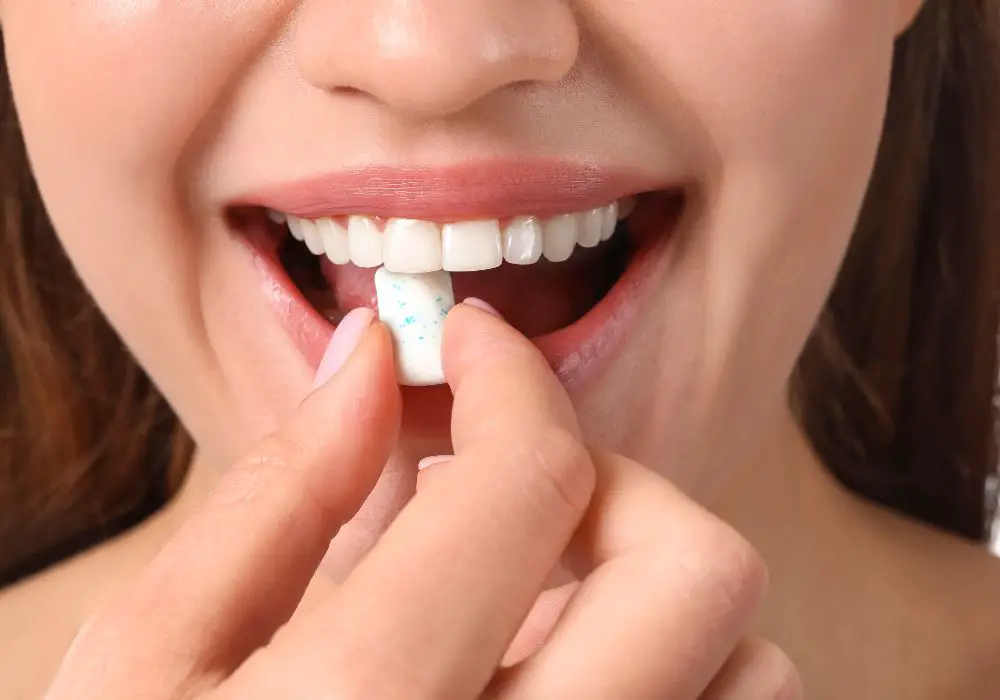
Occasional brief tooth sensitivity from chewing gum will normally resolve on its own once you stop chewing the gum. But prolonged sensitivity or outright tooth pain with chewing warrants an immediate dental appointment. See a dentist right away if you experience:
- Tooth sensitivity or pain that persists longer than 1-2 days after stopping gum
- Sensitivity or looseness in multiple teeth
- Bleeding or swollen gums
- Bumps, sores, or white/red patches in the mouth
- Jaw pain while chewing or popping/clicking in jaw joint
- Headaches or ear pain while chewing gum
- Numbness or tingling of the face, lips, or mouth
- Locked jaw or difficulty opening or closing the mouth fully
A dentist can perform an exam to check for oral health issues like cavities, cracked teeth, failing fillings, gum disease, abscesses, and TMJ disorders. X-rays may be taken to check for unseen problems. Prompt treatment will be provided for any condition contributing to chewing discomfort. Dentists can also advise you on preventing bruxism grinding and clenching habits.
Prevention tips
Follow these tips to chew gum safely without hurting your teeth:
Choose your gum carefully
- Pick a brand that is softer and easy to chew without getting stiff or sticky.
- Avoid very tough, dense gums that require prolonged forceful chewing.
- Select non-acidic gums to avoid erosion of tooth enamel.
- Limit gums with sugar alcohols like sorbitol which may provoke mouth dryness if over-consumed.
- Pick larger size gum pieces which take longer to soften and don’t require as much chewing pressure.
- Alternate gum chewing with xylitol mints or lozenges to give jaw muscles periodic rest.
Practice mindful chewing
- Chew gently rather than vigorously to minimize compression forces.
- Take regular breaks between chewing sessions to rest jaw muscles.
- Avoid resting gum directly on sensitive teeth when chewing.
- Stop chewing if you notice jaw tightness or teeth clenching.
- Switch gum placement periodically from side to side to spread out chewing force.
- Keep teeth slightly parted instead of tightly compressed together while chewing.
Take care of your teeth
- Brush teeth gently twice daily and floss once daily to prevent gum irritation and tooth decay.
- Use a fluoride mouth rinse to strengthen enamel against chewing forces.
- Get regular dental cleanings every 6 months and exams to detect problems early.
- Ask your dentist about a custom nightguard if you grind your teeth at night.
- Drink plenty of water to help neutralize mouth acids and keep your mouth moist and comfortable.
Limit overall chewing time
- Chew gum actively for 10-20 minutes then throw it away rather than chewing for hours.
- Wait at least an hour or two before placing another piece of gum in your mouth.
- Avoid chewing gum every day without breaks – take a couple gum-free days per week.
- Stop chewing gum altogether if you experience any recurrent discomfort or pain.
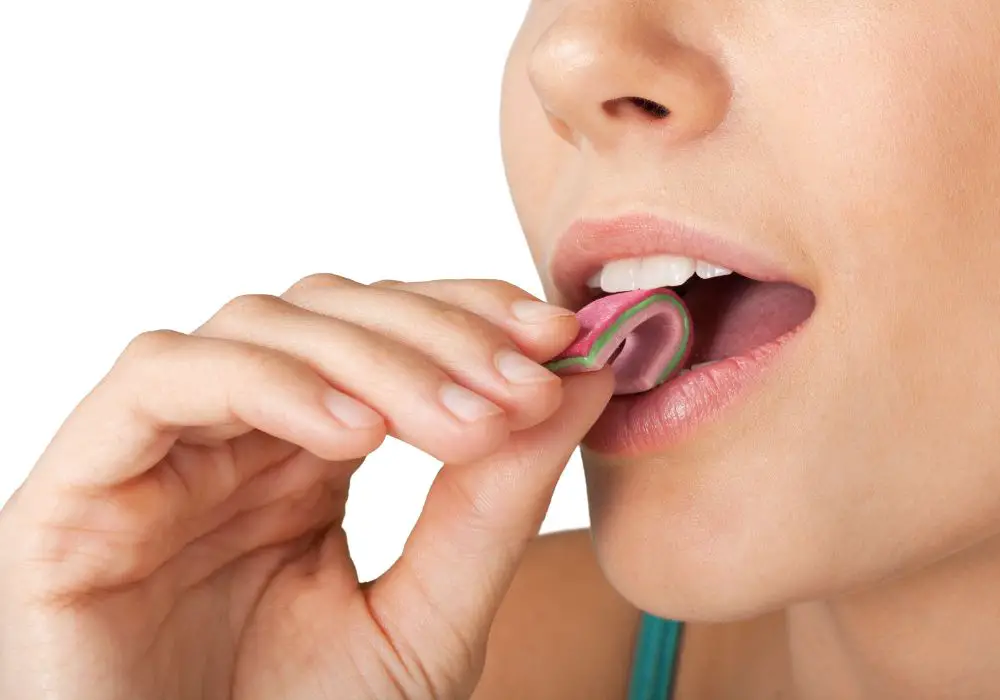
Frequently Asked Questions
Why do my teeth hurt when I chew sugar-free gum?
Sugar-free gum often contains sugar alcohols like sorbitol or xylitol which can provoke mouth dryness if consumed excessively. Saliva helps lubricate and protect the teeth, so reduced saliva leaves teeth prone to irritation. Hard, stiff gums also require prolonged forceful chewing which can rock the teeth and overwork the jaw muscles, causing soreness that feels like tooth pain.
Is chewing gum every day bad for your dental health?
Daily gum chewing is usually fine for teeth and gums if chewing sessions are limited to around 10-20 minutes and rest days are taken to give the jaw a break. Provided you choose a soft, non-acidic gum, chew gently, and maintain good oral hygiene habits, moderate daily gum usage should not damage dental health. But long or frequent sessions with hard, sticky, or acidic gum could cause problems.
Why does my jaw hurt when I chew gum?
Prolonged gum chewing can fatigue the temporalis and masseter muscles used for chewing, causing soreness and tenderness. Clenching or grinding the teeth together during chewing also strains the muscles. Painful spasms of the medial and lateral pterygoid muscles which control jaw opening and closing can result as well. Soreness typically resolves within a day or two after halting gum chewing.
Can chewing gum cause permanent loosening of teeth?
Occasional gum chewing does not loosen healthy permanent teeth, but it may accelerate loosening of teeth already compromised by gum disease or impending tooth loss. Baby teeth near their natural time of falling out may get slightly looser. Stopping gum chewing allows periodontal tissues to recover and stabilize loose teeth. See a dentist if looseness persists.
How can I stop gum pain when chewing?
To prevent gum chewing discomfort, choose a soft gum, chew gently for limited time periods, stop chewing at any twinge of pain, allow days off between chewing sessions, maintain good oral hygiene, address causes of tooth sensitivity with your dentist, and avoid chewing gum, ice or other hard foods.
The Bottom Line
Chewing very acidic, sticky, hard, or sugary gum for too long can overwork the jaw muscles, put excessive force on teeth, and worsen underlying dental problems. This combination of factors can make teeth feel sensitive or outright painful while chewing gum.
The best preventive tactics include limiting chewing sessions to less than 20 minutes, choosing a healthier gum formula, adopting good daily oral hygiene habits, getting regular professional cleanings, and seeing a dentist promptly for any persistent tooth pain. With some care taken to chew responsibly, you can enjoy gum in moderation without hurting your teeth.

